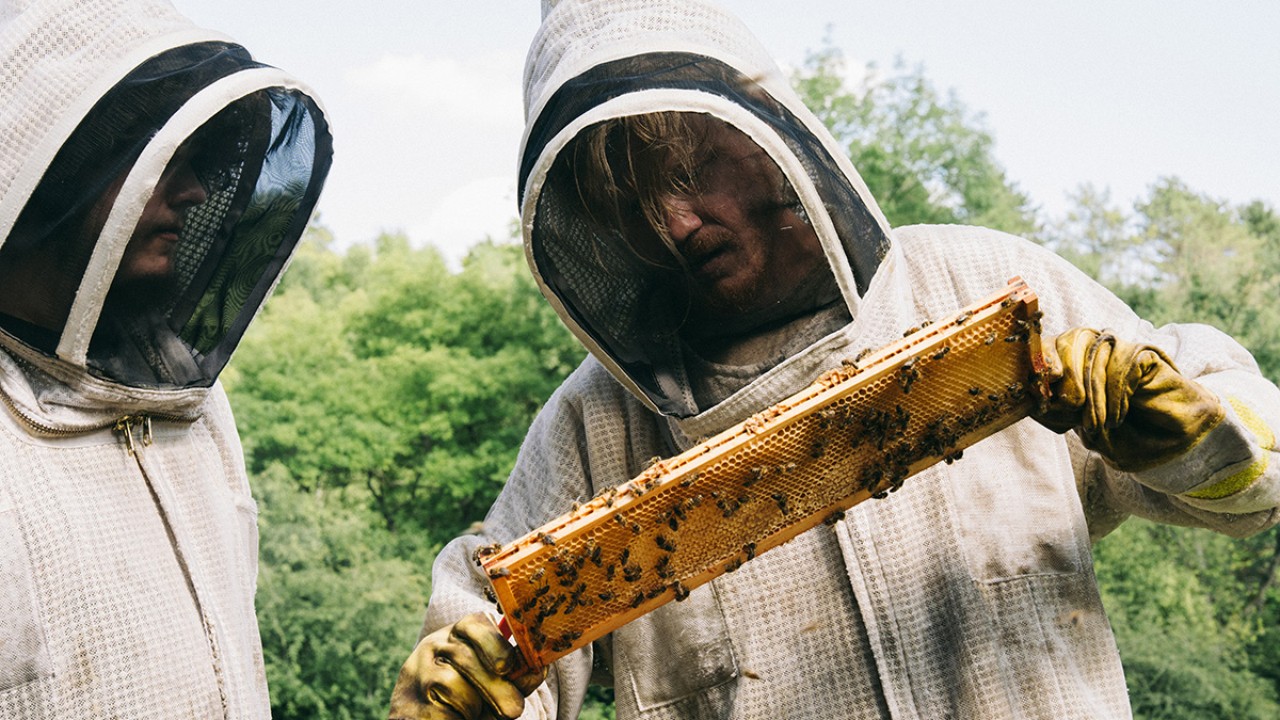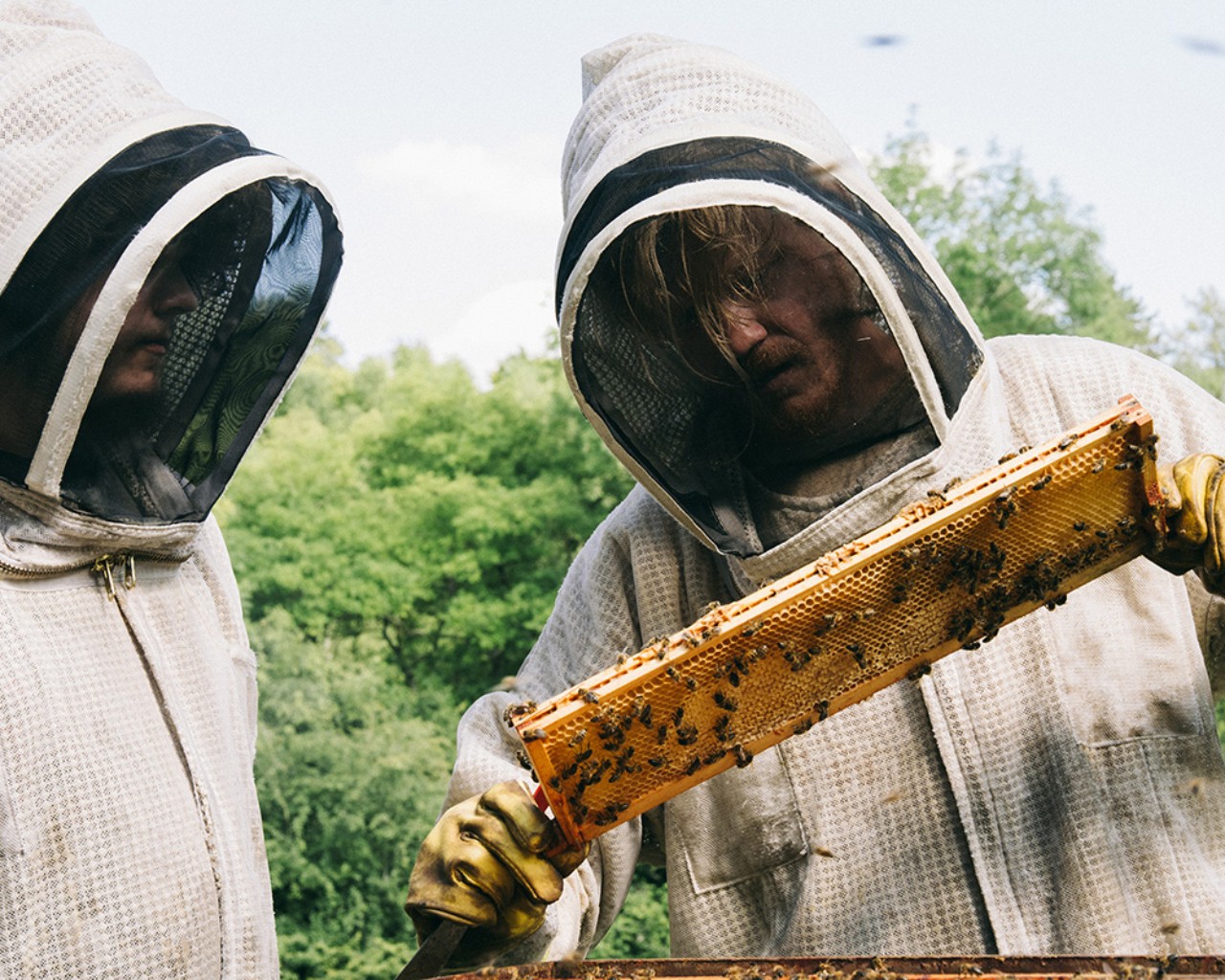

Photograph courtesy of Universal Pictures
Words by Billie Walker
Like many people in a world defined by the extremes of scarcity and abundance, Teddy (Jesse Plemons), feels slighted by society. He’s a hard worker who cultivates a beehive on his property, visits his ailing mother Sandy (Alicia Silverstone), and looks after his younger cousin Don (Aidan Delbis). But a lifetime of tough knocks and mental isolation have led him down a rabbit hole of conspiracy theories, ultimately bringing him to conclude that aliens from the Andromeda Galaxy have infiltrated humanity to bring about its destruction.
Which is how Teddy justifies kidnapping Michelle (Emma Stone), the CEO of the pharmaceutical corporation Auxolith, certain she is one of them. And so begins Bugonia, Yorgos Lanthimos’ new sci-fi thriller adapted from Jang Joon-hwan’s Save the Green Planet. The film follows Teddy as he keeps Michelle locked in his basement, determined to expose her as an extraterrestrial. Through his delusions, the film probes the conspiracy theories that ensnare ordinary people and the corporate power structures that exploit the planet for private profit as the climate crisis barrels onward.
In the real world as in Bugonia, conspiracy thinking in the age of misinformation has moved from the internet fringes into our everyday lives. It is no longer confined to believers in Bigfoot or alien abductions. Today, with the rise of populism and the far right, conspiracy has gone mainstream. Robert F. Kennedy Jr. spreads falsehoods about vaccines, autism, and even seed oils from his perch as the head of the country’s health department, while Men’s Rights Activists such as Andrew Tate tell their millions of followers that feminism, not inequality, is to blame for their frustrations.
From the secluded setting of his home on the outskirts of town, Teddy is an archetype of the isolated paranoiac, precisely the type of person vulnerable to online misinformation. Like many who assemble their belief system from eclectic corners of the internet, his politics are hard to place. He shares some traits with MRAs and others with UFO-obsessives. He calls echo chambers “hegemonic bullshit” and declares to Michelle that “there is no capital, there is no America, there is no democratic order, so don’t talk to me like I’m a dipshit.”
“In the real world as in Bugonia, conspiracy thinking in the age of misinformation has moved from the internet fringes into our everyday lives.”
There is something innately human about conspiracy and the urge to identify who is pulling the strings on the world stage. And it’s therefore no surprise that conspiracy theories thrive in an era of dazzling technological advancement alongside persistent poverty, state-sanctioned violence, and accelerating climate breakdown. Yet despite his violent delusions, Teddy’s anger is rooted in something all too real: his conviction that unchecked corporate greed (albeit, in his mind, directed by alien overlords) has poisoned the planet.
Teddy’s contradictions extend to his tenderness for the natural world. Between preparations for the abduction, he tends to his beehives. And, like many other beekeepers across the United States who witnessed the “largest honeybee die-off on record” in 2024, he mourns their decline. Teddy diagnoses the hives with colony collapse disorder and blames atmospheric pollution caused by extraterrestrial-run corporations like Auxolith for the bees’ deaths. For Teddy, the fate of the bees foreshadows humanity’s own. “A third of our food is pollinated this way,” he warns, convinced that alien impostors like Michelle are orchestrating ecological collapse. “Even if it [Michelle] was human—and it’s not—its corporate cruelty killed the bees,” he later tells Don.
Bugonia unfolds as a clash between two worldviews: the conspiracy-obsessed captor and his self-interested corporate captive, who embodies the detachment of the elite. Michelle exudes the sterile composure of a woman untouched by consequence while completing her multi-step skincare routine, following her strict “anti-aging diet,” delivering a rehearsed speech on diversity in the workplace, or singing along to Chappel Roan’s hit song “Good Luck, Babe!” about heartbreak and denial.
Emma Stone’s performance exposes the quiet arrogance of power and channels the eerie polish of a modern billionaire whose public affect seems almost post-human. During the 2018 Facebook-Cambridge Analytica hearings, Mark Zuckerberg’s unblinking expressions during his live testimony prompted jokes about the social media mogul’s lizard-like demeanor. Other conspiracy theorists have claimed that Bill Gates is part of a group of shapeshifting “reptilian” extraterrestrials, while Elon Musk has declared himself to be an alien, poking fun at rumors he has otherworldly origins. USA Today even runs a fact-check page debunking claims that Jeff Bezos is an alien. Faced with Michelle’s vacant poise, Teddy’s belief that she’s from another planet only strengthens.
“Bugonia is, in the end, a stark allegory for the modern condition in which ordinary people are trapped in systems of exploitation they did not create and cannot escape.”
Flipping decades of alien cinema and urban legend on its head, Bugonia casts Teddy and Don as the aggressors for much of the film. The ragtag pair clumsily enact their plan to abduct their unsuspecting target. Once Michelle is chained in Teddy’s basement, they become convinced she can use her telepathic powers to send for help. In a moment of absurd logic befitting Lanthimos’ darkly comedic style, Teddy insists Michelle must be shaved bald, believing her hair enables communication with her kind, and instructs her to cover her body in cream to limit her supposed powers. In so doing, he turns his already wide-eyed captive into something celestial in appearance, forcing his own delusion into reality.
Michelle tries everything from bartering to threats to win her freedom, but eventually begins to mirror Teddy’s worldview. By confessing that she is an alien from the Andromeda galaxy, she earns previously denied privileges. Over dinner with Teddy and Don, she slips into this extraterrestrial role so convincingly it could be a double bluff. Their conversation turns to bees, which Teddy describes as “Earth’s most admirable creation” and which Michelle says she admires for their “work ethic,” but adds that this very industriousness makes bees easy to exploit.
The irony of conspiracy thinking is that it often begins in some semblance of truth, but ends in a distortion. It recognizes genuine injustice—like vast inequality, political corruption, ecological collapse, and in the case of Bugonia’s Auxolith, pharmaceutical negligence—but misidentifies the source. Instead of tracing power to billionaires who continue to profit openly from the exploitation of people and the planet, conspiracists redirect their anger toward fantasies of women’s liberation, reptilian elites, or alien overlords.
We may not condone Teddy’s actions or share in his delusions, but we can understand his anger. Like the bees under his care, he faces extinction through no fault of his own. “That’s how they [the aliens] planned it,” he tells Don. “[For us to become] a dead colony; atomized.” Bugonia is, in the end, a stark allegory for the modern condition in which ordinary people are trapped in systems of exploitation they did not create and cannot escape. The question is, for how long can the hive survive?
‘Bugonia’ Turns Conspiracy Culture Into a Climate Horror Story